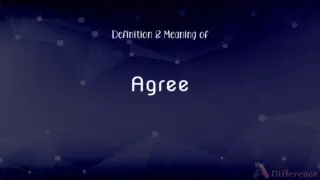Usually Definition and Meaning
By Maham Liaqat & Urooj Arif — Updated on March 5, 2024
Usually means under normal conditions or in most cases. e.g., She usually gets up early in the morning.

Table of Contents
Usually Definitions
Regular Schedule: Occurring at fixed times or on a routine basis.
The train usually arrives on time.
Habitual Route: The path or course one normally takes.
She usually takes the scenic route home.
Common Occurrence: Something that happens often or is the norm.
He usually walks to school.
Frequent Practice: A habit or practice done often.
They usually have dinner at 7 PM.
Standard Procedure: The regular or customary way of doing things.
The meetings are usually held in the conference room.
General Tendency: The overall direction or inclination in behavior or actions.
He usually prefers coffee over tea.
Typical Behavior: Reflecting what is common or expected in behavior.
She usually reads before bed.
Customary Action: An action that is typical or expected based on past behavior.
He usually checks his email first thing in the morning.
Predominant Pattern: The most common pattern or trend observed.
The weather is usually warmer in July.
Ordinary Conditions: Conditions that are normal or expected under typical circumstances.
The park is usually less crowded in the morning.
Commonly encountered, experienced, or observed
The usual summer heat.
Regularly or customarily used
Ended the speech with the usual expressions of thanks.
In conformity with regular practice or procedure
Come at the usual time.
Most of the time; less than always, but more than occasionally.
Except for one or two days a year, he usually walks to work.
Under normal conditions.
Under normal conditions;
Usually she was late
Usually Snonyms
Typically
In most cases; as is usual.
She typically starts her day with a cup of coffee.
Frequently
Happening often; at short intervals.
She frequently visits her family on weekends.
Generally
In most cases; usually.
The weather is generally mild at this time of year.
Regularly
With consistent or uniform frequency.
He meets with his mentor regularly for advice.
Ordinarily
Under normal conditions.
Ordinarily, the procedure is quite straightforward.
Commonly
Ordinarily; usually.
This plant is commonly found in this region.
Customarily
According to the customs or usual practices associated with a particular society, place, or set of circumstances.
It is customarily for the host to offer a toast.
Mostly
For the most part; mainly.
The audience was mostly adults.
Normally
Under normal conditions or circumstances.
We normally go for a walk in the evenings.
Habitually
Done or doing constantly or as a habit.
He habitually checks his email first thing in the morning.
Usually Idioms & Phrases
Usually speaks louder than words
Actions based on usual behavior are more telling than what is said.
In leadership, consistency usually speaks louder than words.
Usually pays off
The idea that doing things in a typically reliable manner often results in success.
Diligence and dedication usually pay off in any career.
Usually comes before a fall
A reminder that overconfidence or complacency often precedes a setback.
He should remember that pride usually comes before a fall.
Usually meets opportunity
The concept that regular preparation or effort encounters chances for success.
For those who are well-prepared, usually meets opportunity.
Wrapped in usually
Engulfed in what is common or expected.
The plot of the movie was wrapped in usually, offering no surprises.
Usually beats the early bird
Suggesting that consistent effort often outperforms sporadic bursts of effort.
In the long run, hard work usually beats the early bird.
The power of usually
The advantage gained by adhering to what is commonly done or believed.
In marketing, understanding the power of usually can predict consumer behavior.
Through the eyes of usually
Viewing something based on what is commonly or typically expected.
Through the eyes of usually, the project seemed destined for success.
Behind usually's mask
The hidden aspects that typical appearances or behaviors may conceal.
She learned that behind usually's mask, the company's culture was quite toxic.
Usually finds a way
An expression of optimism that solutions are often found through usual methods.
No matter the problem, ingenuity usually finds a way.
In usually's clothing
Something or someone that appears typical but isn't.
Beware of scams that come in usually's clothing, seeming legitimate at first glance.
Usually's exception
The rare occurrence that deviates from the norm.
He's never late, so today was usually's exception.
Usually has its day
Acknowledging that conventional methods or ideas have their moments of success.
Traditional marketing usually has its day, despite the digital age.
Usually's companion
Something that commonly accompanies another thing.
In his experience, success was usually's companion with hard work.
Usually's shadow
The influence or effect of typical patterns or behaviors.
His decision was made in usually's shadow, sticking to what worked in the past.
Crossing usually's path
Encountering what is typical or expected.
In his job, he enjoyed crossing usually's path with unexpected challenges.
Usually wears thin
The tolerance or novelty of a regular occurrence diminishes over time.
His excuses for being late have usually worn thin.
Where usually doesn't tread
Referring to actions or ideas that deviate from the norm.
His innovative design was where usually doesn't tread.
Usually's whisper
The subtle hint or indication of what is commonly done or believed.
In the silence, she heard usually's whisper, guiding her to follow her routine for comfort.
Beneath usually's surface
Looking beyond what is commonly perceived or believed.
Beneath usually's surface, there were layers of complexity in the simple story.
Usually Example Sentences
The library is usually quiet, making it a perfect place to study.
The bus is usually crowded during rush hour.
She usually wears her hair in a ponytail.
The museum is usually free on the first Sunday of the month.
I usually do my laundry on the weekend.
We usually go grocery shopping on Saturdays.
She usually calls her grandparents on Sunday evenings.
The classroom is usually cleaned at the end of the day.
The garden is usually full of flowers in the spring.
She usually starts her day with a cup of green tea.
He usually jogs in the park after work.
Our family usually has pizza night on Fridays.
He usually takes his dog for a long walk in the evening.
The teacher usually gives us homework on Fridays.
They usually watch a movie together on Friday nights.
Common Curiosities
How is usually used in a sentence?
She usually arrives at work by 9 am.
Why is it called usually?
"Usually" is called so because it comes from the word "usual," which means common or customary, plus the suffix "-ly," indicating manner or condition.
How many syllables are in usually?
There are four syllables in "usually."
What is the pronunciation of usually?
Usually is pronounced as /ˈjuːʒuəli/ in American English.
What is another term for usually?
Another term for "usually" is "typically."
What is the root word of usually?
The root word of "usually" is "usual."
What is a stressed syllable in usually?
The first syllable, "u," is the stressed syllable in "usually."
What is the verb form of usually?
"Usually" does not have a verb form as it is an adverb. The related verb would be "use."
How do we divide usually into syllables?
Usually is divided into syllables as "u-su-al-ly."
What is the opposite of usually?
The opposite of "usually" could be "rarely" or "seldom."
Is usually a noun or adjective?
"Usually" is an adverb, not a noun or adjective.
Is usually an adverb?
Yes, "usually" is an adverb.
Is usually a negative or positive word?
"Usually" is neutral; it does not inherently convey a positive or negative connotation.
Is usually a collective noun?
No, "usually" is not a collective noun.
Is the word usually imperative?
No, "usually" is not imperative; it describes the frequency of an action.
Which vowel is used before usually?
The vowels used before "usually" depend on the words preceding it in a sentence; there is no specific vowel always used before it.
What is the plural form of usually?
Adverbs do not have plural forms, so "usually" remains the same.
Is the word usually Gerund?
No, "usually" is not a gerund; it is an adverb.
Which determiner is used with usually?
Determiners are not used with adverbs like "usually."
Is the usually term a metaphor?
"Usually" itself is not a metaphor, but it can be used in metaphorical expressions.
Which preposition is used with usually?
Prepositions are not typically used directly with "usually," but it can follow prepositions in a sentence structure.
Which article is used with usually?
Articles are not used with "usually" because it is an adverb, not a noun.
What is the singular form of usually?
"Usually" is an adverb and does not have singular or plural forms.
Is the word “usually” a Direct object or an Indirect object?
"Usually" cannot be a direct or indirect object because it is an adverb, not a noun.
What part of speech is usually?
"Usually" is an adverb.
Is usually an abstract noun?
"Usually" is not a noun; it is an adverb.
Is usually a vowel or consonant?
The question is not applicable to "usually" as a whole since it is a word composed of both vowels and consonants.
Is usually a countable noun?
"Usually" is not a noun, so it is not countable.
Which conjunction is used with usually?
Conjunctions like "and," "but," or "or" can be used in sentences that include "usually," depending on the sentence structure.
Share Your Discovery

Previous Term
Convey Definition and Meaning
Next Term
Single Definition and MeaningAuthor Spotlight
Written by
Maham LiaqatCo-written by
Urooj ArifUrooj is a skilled content writer at Ask Difference, known for her exceptional ability to simplify complex topics into engaging and informative content. With a passion for research and a flair for clear, concise writing, she consistently delivers articles that resonate with our diverse audience.



































